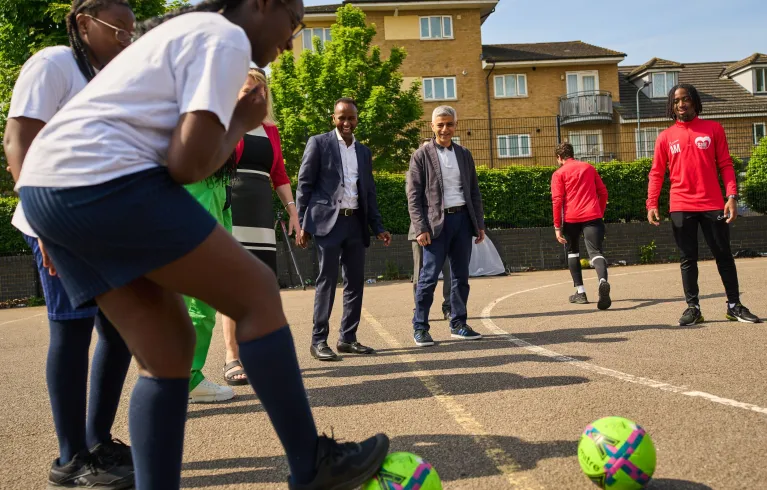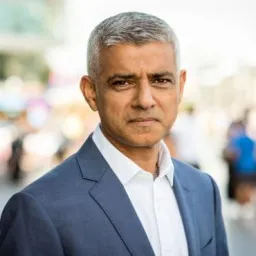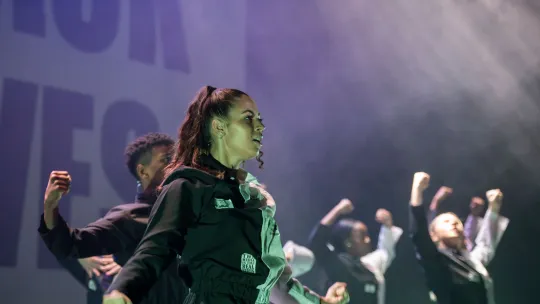Building a safer, fairer city for everyone

Building a safer, fairer city for everyone
The causes of violent crime are complex. Poverty, inequality and a lack of opportunities for young people all play their part. There are no quick and easy fixes.
The Mayor’s top priority is making our communities safer. In his role overseeing the Met Police, the Mayor ensures they serve all Londoners. Learn more how we’re getting tough on crime.
He’s also committed to tackling violence before it happens. That means stepping in early to stop violence from happening in the first place.
One way he's doing this is by investing in activities and opportunities for children and young people, giving them hope and help to stay on the right track.
Playing this video will set cookies from YouTube/Google
Making London the safest place in the world to grow up
Our prevention strategy focuses on funding interventions to divert young people away from violence and providing a helping hand at critical moments in a young person’s life.
That means:
- working to keep children in school where they are safe and can thrive
- supporting families affected by violence
- working to keep young people safe from exploitation and criminal gangs, in the crucial after-school period by investing in access to youth clubs and hubs
- providing access to mentors
- funding the life-changing work done by youth workers – who make a difference every day in neighbourhoods, schools, police custody suites and hospitals.
Through London’s Violence Reduction Unit and the Mayor’s New Deal for Young People, he’s created more than 500,000 positive opportunities for young Londoners – helping them move towards a brighter future.
How it's making a difference
Through this prevention approach, we’re making strong progress to build a safer and fairer future for all Londoners.
-
400,000+
positive opportunities through the VRU to divert young Londoners away from violence, towards education, training and employment.
-
100,000+
young Londoners have accessed mentoring support through the Mayor’s New Deal for Young People.
There have been reductions in murders and killings (homicides) and how many young Londoners are injured with knives. In 2024, there were fewer homicides of people under 25 in London than any year since 2003. The number of teenage killings in London last year was at its lowest since 2012.
Preventing violence before it happens
The Mayor believes that crime is preventable, not inevitable. That’s why he set up London’s Violence Reduction Unit (VRU) – the first in England and Wales – to create solutions that tackle the root causes of crime.
The VRU has funded and created more than 400,000 positive opportunities for children and young people across London.
Here’s how the Mayor and the VRU are preventing crime in London.
Playing this video will set cookies from YouTube/Google
Watch My Ends video poem from our work with communities.
London’s VRU is committed to supporting families affected by violence or at risk of exploitation. Its network of 20,000 parents and carers covers nearly every borough. The network helps them navigate the criminal justice and education system and to better support children online.
Its targeted Strengthening Fathers programme enhances father-child relationships. It supports absent fathers to reconnect with their children. In particular, young fathers and those involved in probation and social care services.
The programme equips fathers with the skills and support to:
- strengthen family relationships
- improve co-parenting dynamics
- be positive role models.
We know that children and young people should be in school. It’s where our young people learn, but it’s also where they’re safe.
New research finds that teenagers permanently excluded from school are twice as likely to commit serious violence within a year of being excluded.
That’s why the VRU developed London’s Inclusion Charter – to tackle rising suspensions, persistent absenteeism and exclusions.
The Inclusion Charter was shaped by young people, teachers, parents and carers, and local authorities. The VRU supports them to use the Charter to guide how their policies and practice.
Evidence shows that violence affecting young people is most likely to happen after-school. So, it’s important for young people to opportunities out of school hours. Access to activities can keep them safe, away from crime and learn skills to help them thrive in adulthood.
The VRU’s Stronger Futures programme aims to do exactly that. It funds organisations to run after-school programmes for young people who are at-risk of violence and exploitation.
The VRU has already invested in 18 targeted projects across London, supporting 3,000 young people. See what’s happening in your area.
Playing this video will set cookies from YouTube/Google
The Mayor visited one of these programmes, ‘The Safety Box’ at a school in Tottenham. Watch the video to learn about its impact.
In hospitals
A traumatic or near-death experience is stark reminder of the dangers that come along with crime. Research describes it as a ‘teachable moment’, where young people are more likely to think about making big lifestyle changes.
The VRU is investing £7.8m to embed youth workers into hospitals across London. They are in the A&E units and major trauma centres with most young victims of violence.
These youth workers support young victims to:
- re-build a life beyond crime
- reduce their exposure and involvement in violence
- ensure they are never back on the hospital bed.
Read more in the Hospital-based youth work evaluation.
In custody
A run in with the criminal justice system is another critical turning point in a young person’s life. It’s a reminder of how crime has consequences that can result in time spent behind bars.
That’s why independent and confidential youth workers (who are not police officers or prison wardens) are needed to support young people in custody. To divert them away from crime and into education, training and employment.
Since 2015, the VRU’s DIVERT programme has provided 18-25 year olds held in a Brixton custody suite with a youth worker. They are there to help young people forge a better path.
Thanks to the Mayor’s funding, the DIVERT programme now runs across London.
Sports have positive benefits for everyone’s mental and physical health. They are a fantastic way to engage at risk-young people. Sports help them put their energy into activities that are good for them and away from those that are bad.
The VRU is partnering with the Mayor’s Sports Team to invest £2m in sports projects. These support young people away from crime and violence. The funding also supports young people with food and travel costs to the sports activities. This helps reduce barriers, so more young people can take part.
The VRU also creates pathways for young people and organisations supporting young people into sport. This includes:
- a year-long Sports Leadership Academy for 100 young Londoners from underserved communities
- paid internships with top organisations like England Netball, Women in Sport and GB Snowsport for those breaking into the sports industry
- coordinating an expert steering group for organisations using sport to keep young people safe from violence.
Communities know their area and its challenges better than anyone.
Evidence shows that a community-led approach is the most effective way to prevent violence.
The Mayor’s award-winning ‘MyEnds’ programme provides communities with the resources to deliver their own prevention measures. This includes:
- support networks for parents and carers
- after-school activities in sport, music, drama and more
- vital youth work and youth clubs.
Mentoring young people to a brighter future
Having a trusted adult relationship is important in a young person’s life. It can help them develop the skills to thrive in adulthood. But not all young people have this. Not having enough guidance can make them worry about what their future holds.
Thanks to the Mayor’s New Deal for Young People, more young Londoners now have access to mentoring and youth activities.
It’s helping to make London the greatest city in the world to grow up in – where all young people have the support they need to get ahead and no one is left behind.
Playing this video will set cookies from YouTube/Google
Watch Sadie's mentoring story.
Mentoring opportunities can look like:
- one-to-one sessions
- group classes in schools and youth clubs
- online engagement.
The sessions are changed to suit the needs and interests of young people. They focus on subjects like music, sport, creative arts, education and careers.
Introducing this trusted relationship to a young person’s life can help make a positive change in lots of ways.
Mentoring is already helping thousands of young Londoners to:
- build their confidence and skills
- develop ways to better cope with setbacks
- meet new people with access to different social networks
- make better informed choices
- boost their mental health
- improve relationships with family
- find paths into training and employment.
With the Mayor's New Deal for Young People, we're making sure there are more quality opportunities for young people now – and the future.
I firmly believe that violence is preventable, not inevitable and I’m committed to investing in young people and giving them the opportunity to reach their full potential as part of ensuring we build a safer, fairer London for everyone.
Find out more and get involved
London’s Violence Reduction Unit brings people across London together to better understand why violence happens and to prevent it now, and in the long-term.
A new deal that recognises the huge challenges that the pandemic has presented to London's young people.
Find out what the Mayor is doing to help London's children and young adults make the most of our city.
Find out more about the LVN app and access mentoring support and over 2000 opportunities for young people.
Need a document on this page in an accessible format?
If you use assistive technology (such as a screen reader) and need a version of a PDF or other document on this page in a more accessible format, please get in touch via our online form and tell us which format you need.
It will also help us if you tell us which assistive technology you use. We’ll consider your request and get back to you in 5 working days.




